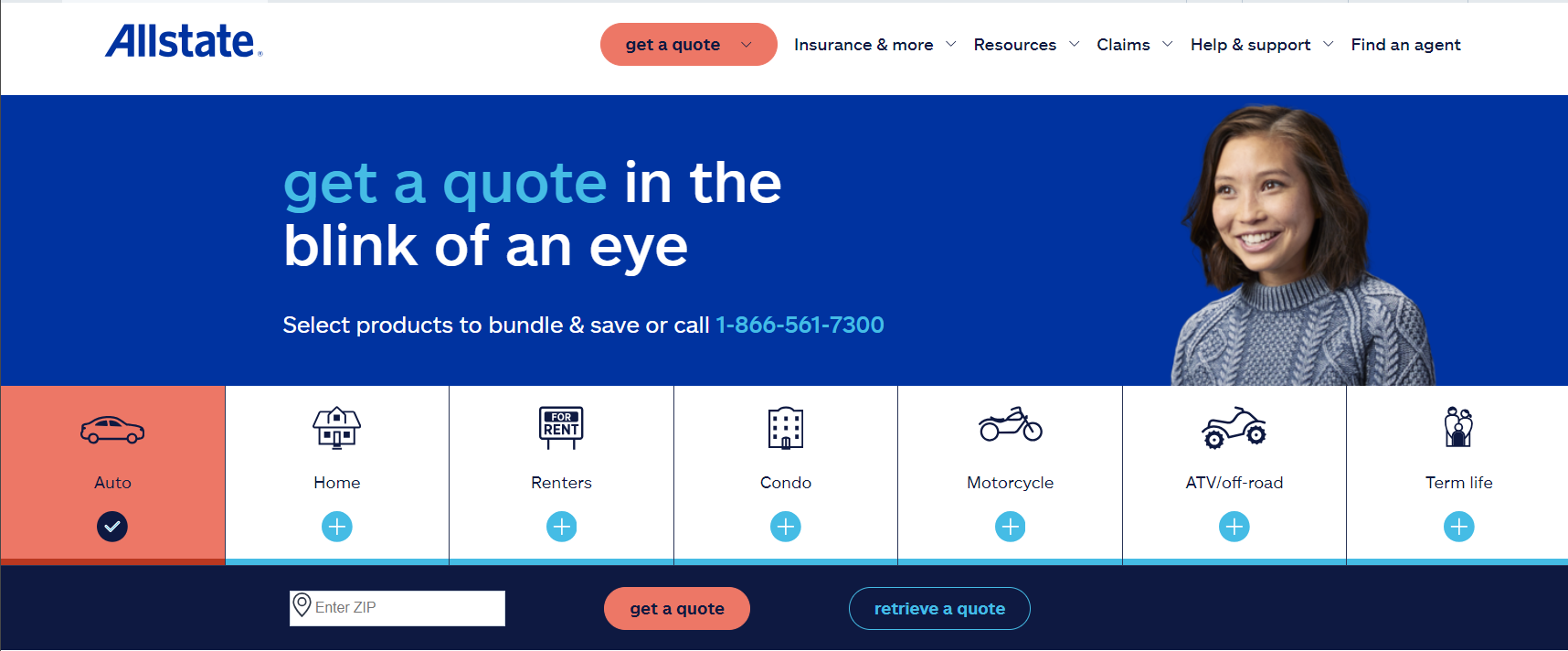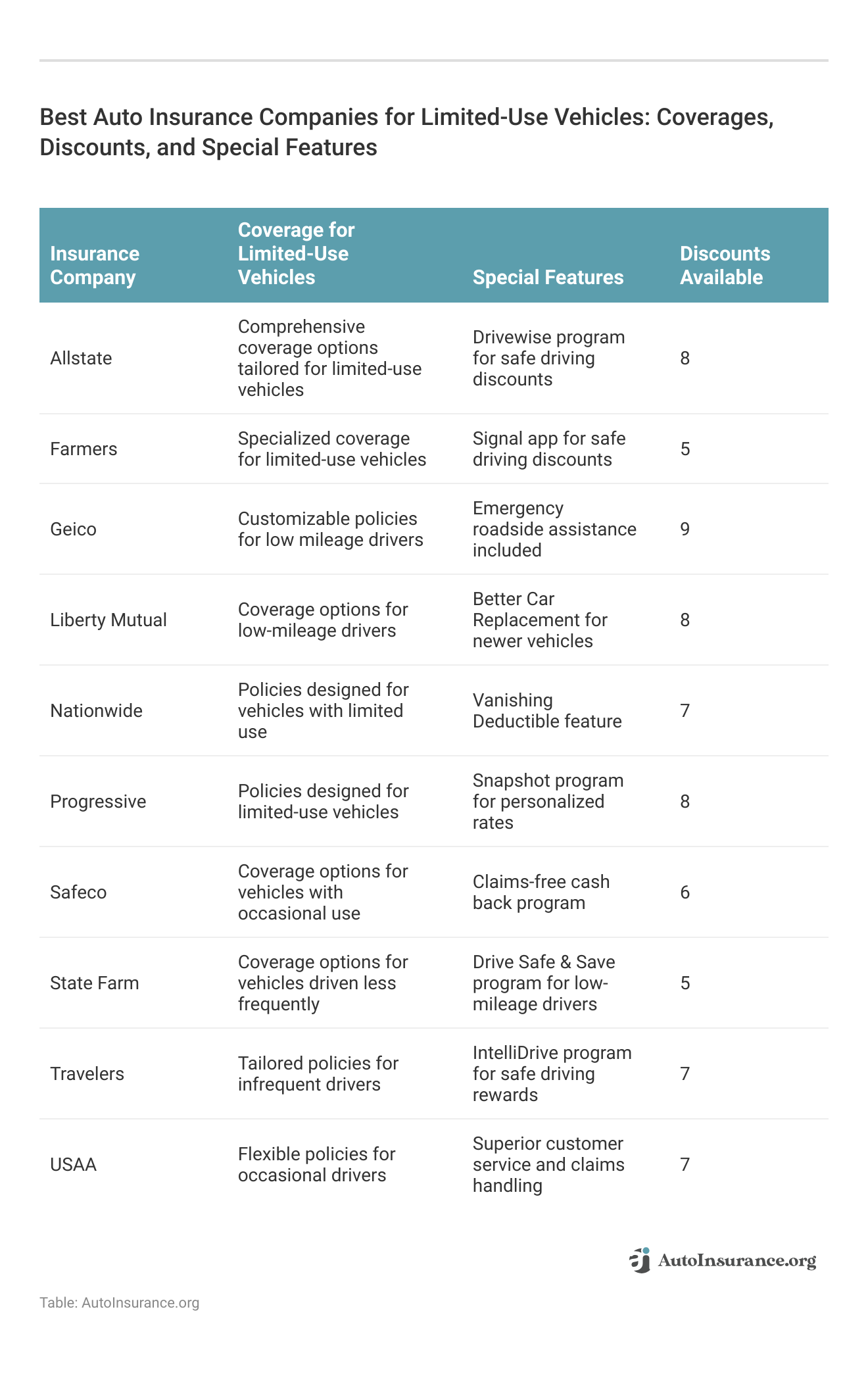Best Auto Insurance for Limited-Use Vehicles in 2025 (Top 10 Companies Ranked)
Allstate, USAA, and Geico offer the best auto insurance for limited-use vehicles, with premiums starting as low as $39 per month. We aim to facilitate your comparison of rates among these esteemed providers, guaranteeing you secure the finest coverage and customized discounts suited to your vehicle needs.
Free Car Insurance Comparison
Compare Quotes From Top Companies and Save
Secured with SHA-256 Encryption
Jeffrey Manola
Licensed Insurance Agent
Jeffrey Manola is an experienced insurance agent who founded TopQuoteLifeInsurance.com and NoMedicalExamQuotes.com. His mission when creating these sites was to provide online consumers searching for insurance with the most affordable rates available. Not only does he strive to provide consumers with the best prices for insurance coverage, but he also wants those on the market for insurance to ...
UPDATED: Jan 15, 2025
It’s all about you. We want to help you make the right coverage choices.
Advertiser Disclosure: We strive to help you make confident auto insurance decisions. Comparison shopping should be easy. We are not affiliated with any one auto insurance provider and cannot guarantee quotes from any single provider. Our partnerships don’t influence our content. Our opinions are our own. To compare quotes from many different companies please enter your ZIP code on this page to use the free quote tool. The more quotes you compare, the more chances to save.
Editorial Guidelines: We are a free online resource for anyone interested in learning more about auto insurance. Our goal is to be an objective, third-party resource for everything auto insurance related. We update our site regularly, and all content is reviewed by auto insurance experts.
UPDATED: Jan 15, 2025
It’s all about you. We want to help you make the right coverage choices.
Advertiser Disclosure: We strive to help you make confident auto insurance decisions. Comparison shopping should be easy. We are not affiliated with any one auto insurance provider and cannot guarantee quotes from any single provider. Our partnerships don’t influence our content. Our opinions are our own. To compare quotes from many different companies please enter your ZIP code on this page to use the free quote tool. The more quotes you compare, the more chances to save.
On This Page
 11,638 reviews
11,638 reviewsCompany Facts
Full Coverage for Limited-Use Vehicles
A.M. Best Rating
Complaint Level
Pros & Cons
 11,638 reviews
11,638 reviews 6,589 reviews
6,589 reviewsCompany Facts
Full Coverage for Limited-Use Vehicles
A.M. Best Rating
Complaint Level
Pros & Cons
 6,589 reviews
6,589 reviews 19,116 reviews
19,116 reviewsCompany Facts
Full Coverage for Limited-Use Vehicles
A.M. Best Rating Score
Complaint Level
Pros & Cons
 19,116 reviews
19,116 reviews- Allstate presents competitive pricing starting from $39 monthly
- Premier insurance companies offer potential markdowns
- Discount opportunities exist for limited-utilization vehicles
#1 – Allstate: Top Overall Pick
Pros
- Competitive Pricing: Offers rates as low as $39 per month for limited-use vehicles.
- Comprehensive Coverage: Provides a wide range of coverage options tailored to individual driving needs.
- Reputation: Well-known for superior auto insurance service and reliability. Use our Allstate auto insurance review as your guide.
Cons
- Premium Variability: Some customers may find rates slightly higher compared to other providers.
- Discount Availability: Certain discounts may not be universally available and depend on location and driving history.
Free Auto Insurance Comparison
Enter your ZIP code below to view companies that have cheap auto insurance rates.
Secured with SHA-256 Encryption
#2 – USAA: Best for Military Savings
Pros
- Competitive Rates: USAA, as mentioned in our USAA auto insurance review, offers highly competitive rates for limited-use vehicles.
- Exceptional Customer Service: Known for excellent customer service and satisfaction ratings.
- Exclusive Membership Benefits: Provides exclusive benefits and discounts for military members and their families.
Cons
- Limited Eligibility: Available only to current and former military members and their families.
- Coverage Limitations: Coverage options may not be as extensive for non-military customers.
#3 – Geico: Best for Cheap Rates
Pros
- Affordable Pricing: Budget-friendly rates for limited-use vehicles. Read our Geico auto insurance review for details.
- User-Friendly Tools: Offers easy-to-use online tools for obtaining quotes and managing policies.
- Nationwide Presence: Has a nationwide presence and a reputation for customer satisfaction.
Cons
- Limited Local Support: Availability of local agents for in-person support may be limited.
- Premium Variability: Some drivers with less-than-perfect records may experience higher premiums.
#4 – State Farm: Best for Many Discounts
Pros
- Extensive Local Support: Boasts a vast network of local agents for personalized assistance.
- Strong Customer Service: Holds a reputation for excellent customer service and claims handling.
- Variety of Options: Offers a wide range of coverage options and discounts. Find out more in our State Farm auto insurance review.
Cons
- Slightly Higher Premiums: Some customers may find premiums to be slightly higher compared to other providers.
- Limited Discount Availability: Certain discounts may not be available in all states or for all drivers.
Free Auto Insurance Comparison
Enter your ZIP code below to view companies that have cheap auto insurance rates.
Secured with SHA-256 Encryption
#5 – Nationwide: Best for Usage Discounts
Pros
- Flexible Coverage: Provides flexible coverage options suitable for limited-use vehicles.
- Discount Variety: Offers a variety of discounts to help lower premiums.
- Financial Stability: As mentioned in our Nationwide insurance review, known for strong financial stability and customer service reputation.
Cons
- Premium Variability: Premiums may vary significantly based on location and driving record.
- Online Experience: Some customers may find the online experience less intuitive compared to other providers.
#6 – Farmers: Best for Local Agents
Pros
- Personalized Service: Offers personalized service from local agents. Use our Farmers auto insurance review as your guide.
- Coverage Options: Provides a range of coverage options and discounts.
- Claims Handling: Reputation for strong claims handling and customer service.
Cons
- Higher Premiums: Premiums may be higher compared to some competitors.
- Discount Availability: Availability of certain discounts may vary depending on location and driving history.
#7 – Liberty Mutual: Best for Customizable Policies
Pros
- Coverage Variety: Offers a wide range of coverage options for limited-use vehicles.
- User-Friendly Tools: Provides user-friendly online tools and mobile app for policy management.
- Discount Availability: Offers a variety of discounts to help lower premiums. Check other details through our Liberty Mutual auto insurance review.
Cons
- Slightly Higher Premiums: Some customers may find premiums to be slightly higher compared to other providers.
- Limited Local Support: Availability of local agents may be limited in certain areas.
Free Auto Insurance Comparison
Enter your ZIP code below to view companies that have cheap auto insurance rates.
Secured with SHA-256 Encryption
#8 – Travelers: Best for Accident Forgiveness
Pros
- Customizable Coverage: Provides customizable coverage options tailored to individual needs.
- Financial Stability: Known for strong financial stability and customer satisfaction.
- Discount Availability: Offers discounts to help reduce premiums.
Cons
- Limited Local Support: Our Travelers auto insurance review reveals that availability of local agents for personalized support may be limited.
- Premium Variability: Premiums may be higher for some drivers depending on location and driving history.
#9 – Safeco: Best for Exclusive Benefits
Pros
- Competitive Rates: Offers competitive rates for limited-use vehicles. Read more with our Safeco auto insurance review.
- Coverage and Discounts: Provides a variety of coverage options and discounts to choose from.
- User-Friendly Experience: Offers an easy online quote process and convenient policy management tools.
Cons
- Limited Local Support: Availability of local agents for in-person support may be limited.
- Premium Variability: Some drivers with less-than-perfect records may experience higher premiums.
#10 – Progressive: Best for Online Convenience
Pros
- Online Tools: In our Progressive auto insurance review, they provide user-friendly online tools for obtaining quotes and managing policies.
- Coverage Options: Offers a variety of coverage options suitable for limited-use vehicles.
- Discount Availability: Provides a range of discounts to help lower premiums.
Cons
- Slightly Higher Premiums: Some customers may find premiums slightly higher compared to other providers.
- Limited Local Support: Availability of local agents for personalized support may be limited in certain areas.
Free Auto Insurance Comparison
Enter your ZIP code below to view companies that have cheap auto insurance rates.
Secured with SHA-256 Encryption
Insurance Carriers Want to Know How Much You Drive Each Year
Direct Effect of Mileage on your Rates
Insurers Will Offer Discounts to Drivers Who Limit Usage In Other Ways

Frequently Asked Questions
What is auto insurance for limited use?
Auto insurance for limited use is a type of insurance coverage designed for vehicles that are used sparingly or have specific restrictions on their usage. It provides insurance protection for situations when the vehicle is not being driven regularly or is used for specific purposes only. Enter your ZIP code now.
What are some examples of limited use vehicles?
How is limited use auto insurance different from regular auto insurance?
Limited use auto insurance differs from regular auto insurance in terms of coverage and pricing. Since limited use vehicles are not driven as frequently, they pose lower risks and may require less coverage. As a result, limited use auto insurance policies may have lower premiums compared to standard auto insurance policies.
What types of coverage are available for limited use auto insurance?
The specific types of coverage available for limited use auto insurance may vary between insurance providers. However, common coverage options include liability coverage, comprehensive coverage, collision coverage, uninsured/underinsured motorist coverage, and agreed value coverage (for classic or collector cars). Enter your ZIP code to start comparing.
Can I use a limited use vehicle for commuting to work?
Are there mileage restrictions for limited use auto insurance?
Yes, there may be mileage restrictions associated with limited use auto insurance. Insurance providers may set specific limits on the number of miles you can drive your limited use vehicle within a given period, such as a year. Exceeding these mileage restrictions may result in reduced coverage or policy violations, so it’s important to be aware of and adhere to these limitations.
Can I modify my limited use vehicle without affecting my insurance coverage?
Modifying a limited use vehicle may impact your insurance coverage. It’s crucial to notify your insurance provider about any modifications made to your vehicle to ensure that your coverage remains valid. Failure to disclose modifications could lead to denied claims or policy cancellation. It’s always best to consult with your insurance provider before making any modifications. Enter your ZIP code now.
Is limited use auto insurance available in all states?
How can I find the best limited use auto insurance policy?
To find the best limited use auto insurance policy, consider the following steps:
- Research and compare insurance providers that offer limited use auto insurance.
- Assess the coverage options and pricing of each provider.
- Read customer reviews and ratings to gauge the quality of their service.
- Request quotes from multiple providers to compare premiums.
- Evaluate any additional benefits or discounts offered.
- Consult with an insurance agent to clarify any doubts or questions you may have before making a decision.
Can I switch from a regular auto insurance policy to limited use auto insurance?
Yes, it is often possible to switch from a regular auto insurance policy to a limited use auto insurance policy. Contact your current insurance provider or explore other providers that offer limited use coverage. Make sure to review the terms, coverage options, and pricing to ensure it suits your specific needs before making the switch. Enter your ZIP code now.
Free Auto Insurance Comparison
Enter your ZIP code below to view companies that have cheap auto insurance rates.
Secured with SHA-256 Encryption
Jeffrey Manola
Licensed Insurance Agent
Jeffrey Manola is an experienced insurance agent who founded TopQuoteLifeInsurance.com and NoMedicalExamQuotes.com. His mission when creating these sites was to provide online consumers searching for insurance with the most affordable rates available. Not only does he strive to provide consumers with the best prices for insurance coverage, but he also wants those on the market for insurance to ...
Editorial Guidelines: We are a free online resource for anyone interested in learning more about auto insurance. Our goal is to be an objective, third-party resource for everything auto insurance related. We update our site regularly, and all content is reviewed by auto insurance experts.














